THE IMO ROLLS OUT THE RED CARPET FOR GREENWASHING
30.09.2024
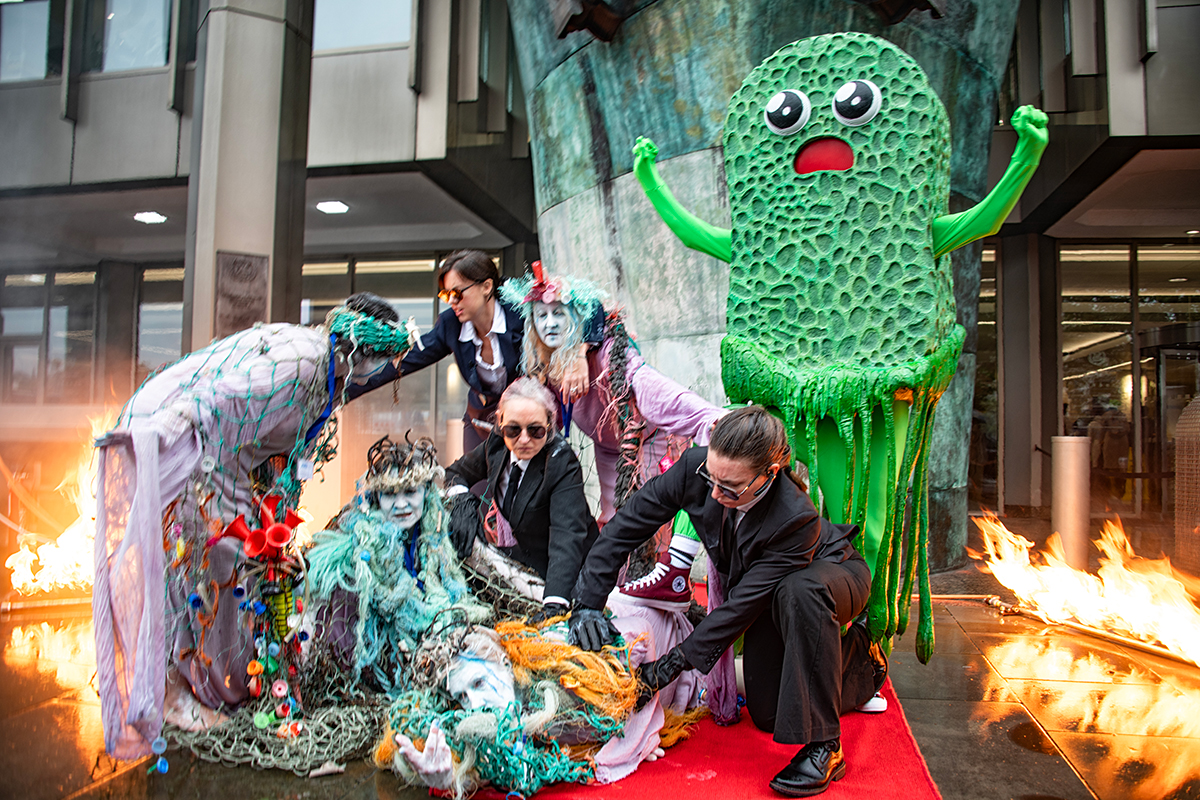
⬆️ Greenwashing sponge ‘Scrubby’ unleashes its security to pin Poseidon to the carpet. A sea-god is no match against corporate greed. Eat carpet sea-god! Photo Guy Reece.
Today Ocean Rebellion protested against greenwashing at the UN International Maritime Organisation (IMO).
On the first day of the UN IMO MEPC82 (82nd Marine Environmental Protection Committee), IMO delegates and Member States were treated to a red carpet reception in honour of their awe-inspiring greenwashing of the fossil fuel, Liquid Natural Gas (LNG).
Arriving in a white Rolls Royce to host the red carpet and greet delegates from Member States was International Unicode Emoji megastar influencer (and master greenwasher), ‘Scrubby‘ the green sponge, corporate star of New York Climate Week.
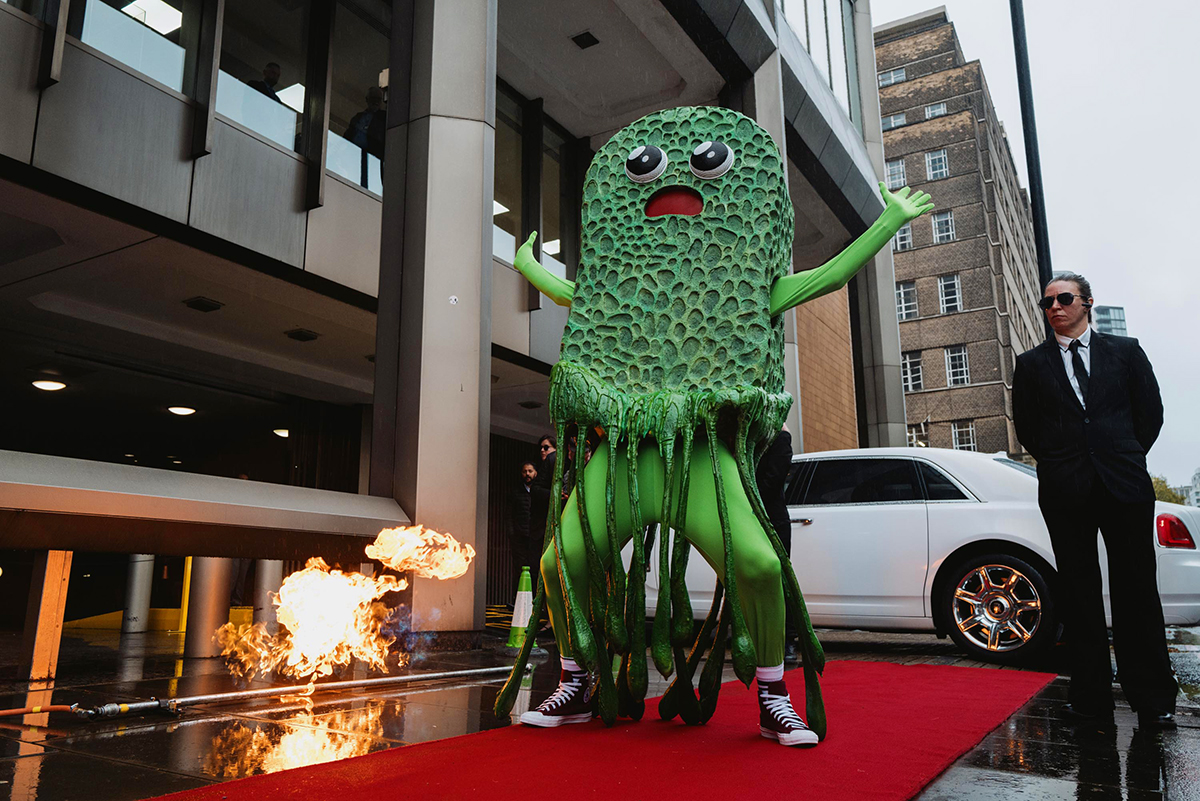
⬆️ LNG flames roar the arrival of Scrubby. Go Scrubby, those LNG flames need a good greenwashing. Photo João Daniel Pereira.
Scrubby drifted in on currents from the States to greet delegates from the Netherlands, Canada, the US, South Korea, Japan, China, Australia, the UK, and Brazil. Security was provided by a band of athletic goons paid for by Royal Caribbean, Maersk, CMA CGM and MSCC. Scrubby was keen to thank them for their help greenwashing Liquid Natural Gas (LNG) and for their support in publicising its campaign through their Pro-LNG lobbying group SEA-LNG. The excited sponge couldn’t contain itself as it oozed green slime across the red carpet while LNG flames flared spectacularly in the background.
The fate of the Ocean depends on us all.
Our interventions depend on your support.
scrubby loves fossil fuels
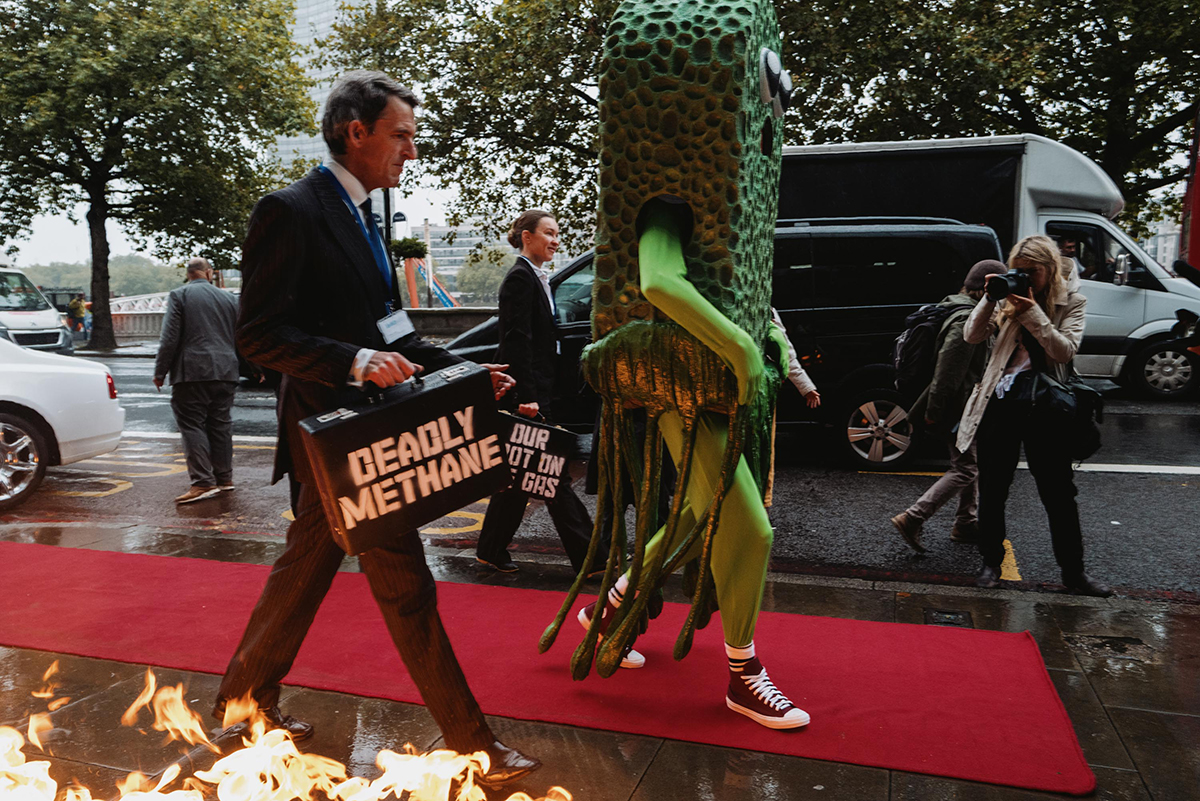
⬆️ Delegates from the US and Canada flank Scrubby, both carry a briefcase containing samples of the fracked gas they’ll be selling to the shipping industry. Photo João Daniel Pereira.
scrubby loves lng
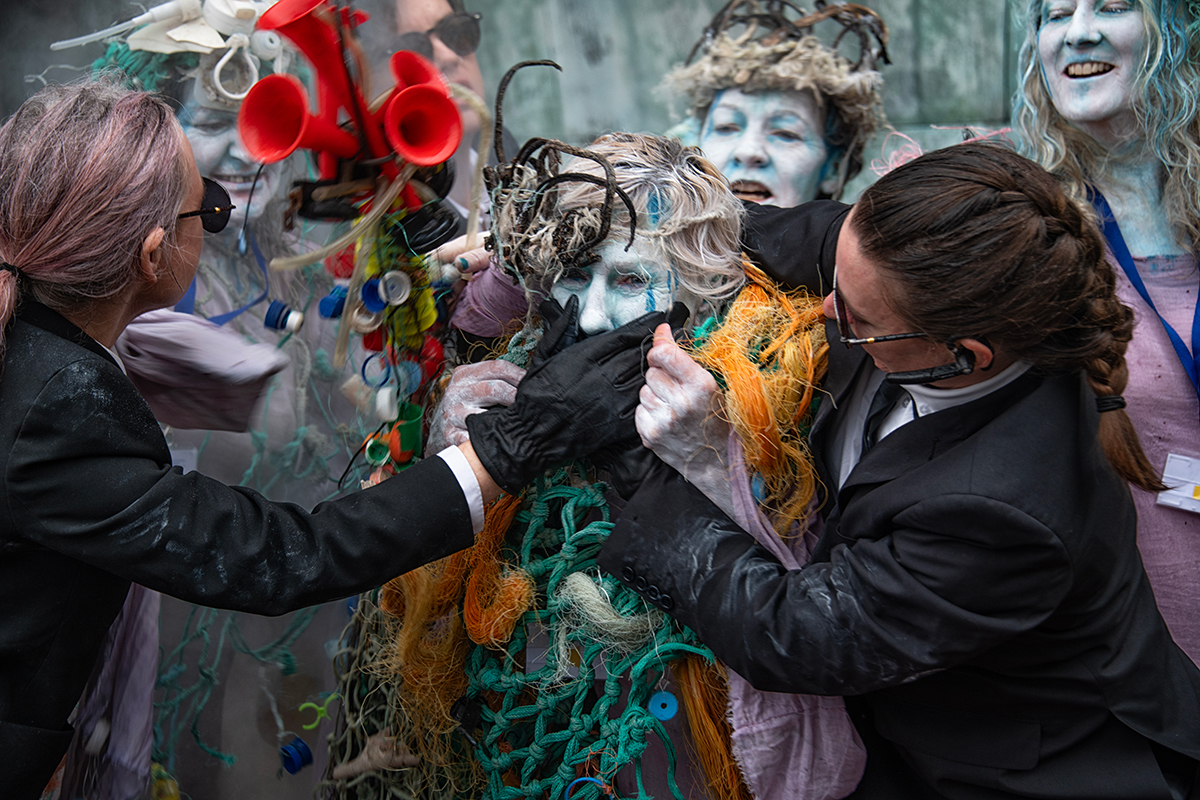
⬆️ Security gags Poseidon and the Sirens. The truth isn’t important to the fossil fuel industry, they will do anything to stop people from hearing how harmful LNG is. Photo Guy Reece.
Enraged by Scrubby and his shoddy greenwashing, protestors from Ocean Rebellion, led by Poseidon and her Sirens, burst onto the red carpet. Three security guards tried to prevent Poseidon from accosting Scrubby and the red carpet became a battleground.
Poseidon tried to lecture Scrubby on how appalling greenwashing is, how it confuses the public and allows companies like Maersk, Royal Caribbean, and MSC to hoodwink IMO delegates by claiming LNG is a green fuel. She tried to tell Scrubby how the IMO is doing nothing to stop LNG becoming the fossil fuel of choice for shipping. But Scrubby’s security had other plans. First of all they gagged the sea-god and then they wrestled her to the floor, where they pinned her down and crushed her spirits.
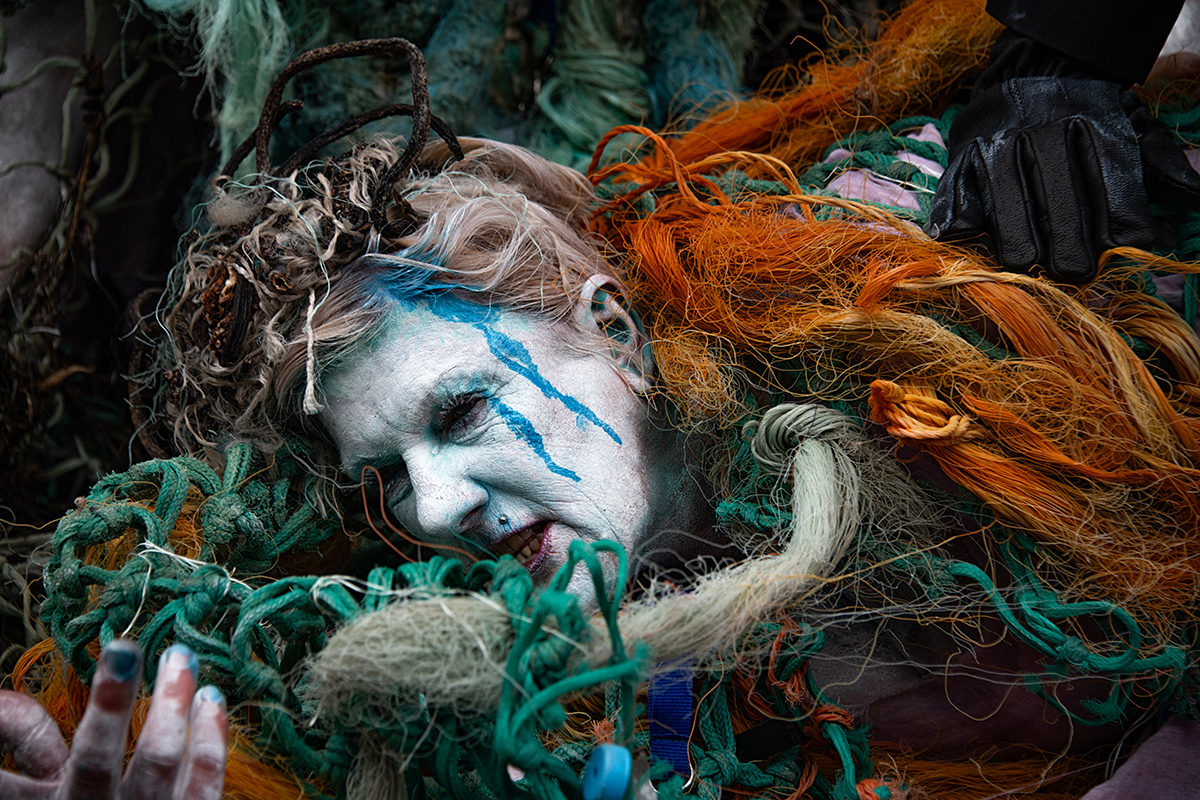
⬆️ The sea-god was crushed by a magic sponge of greenwashing lies. Photo Guy Reece.
In the European Union alone, consumption of LNG by ships has doubled from 2.2 million tonnes (Mt) in 2018 to 4.4 Mt in 2022. LNG uptake is based on the deceptive notion that it is an alternative, clean fuel. This is where LNG proponents are engaging in gaslighting, deceiving the maritime sector and all of us.
Gaslighting is a form of psychological manipulation used to make you doubt your own perceptions and sanity, often by distorting facts or reality. LNG fans are employing gaslighting tactics, like funding research and selectively citing studies that support their narrative while discrediting researchers highlighting LNG’s risks. They are also undermining dissenting community voices and opinion leaders by labelling them as “alarmists” or “obstructionists.”
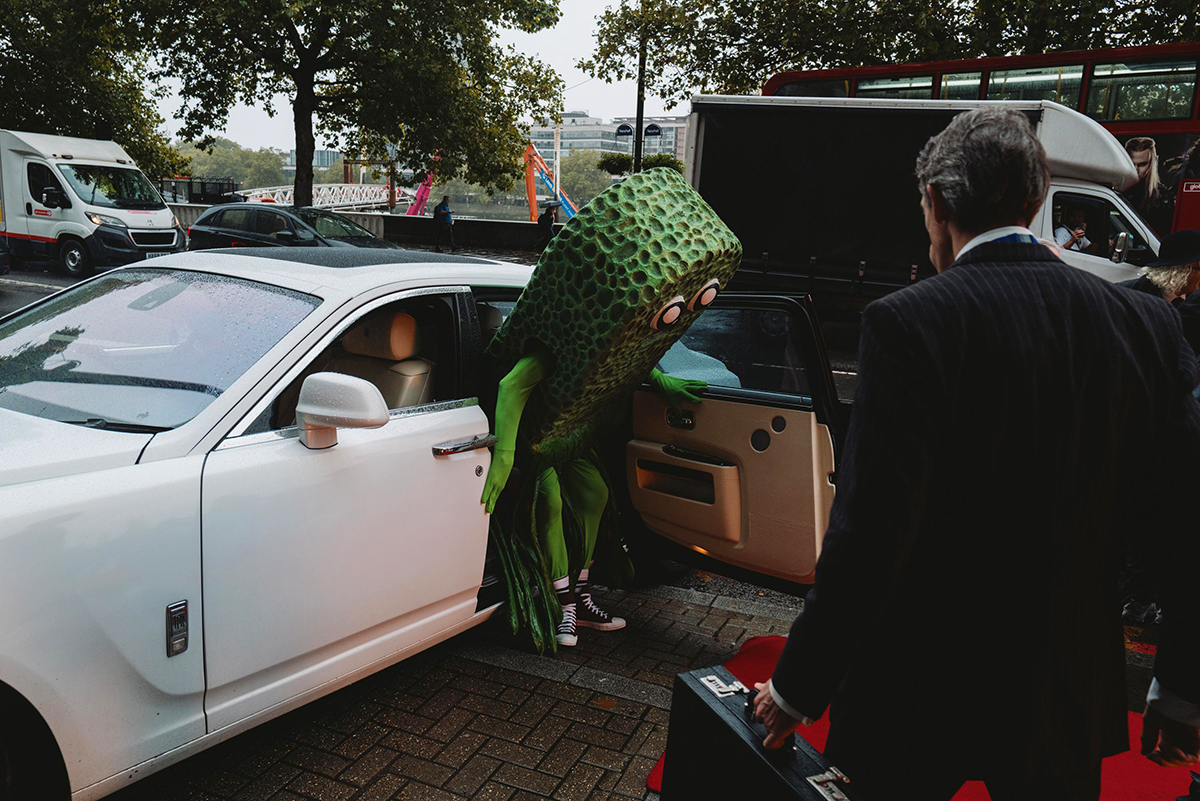
⬆️ Scrubby squeezes out of a white Rolls Royce. Greenwashing sponges can fit in very tight spaces. This makes them perfect for institutions like the IMO – they can slip in unseen disguised as credible organisations, like SEA-LNG, and pretend they have a green solution to shippings pollution problems. Photo João Daniel Pereira.
Enterprises such as these, engaging in gaslighting while making sustainability claims, may be violating their legal responsibilities to shareholders and risk litigation if such material risks, including the litigation risk, are not properly reflected in their audited accounts. Likewise, credit rating agencies which fail to detect this greenwash are also failing to give accurate sustainability readouts to their subscribers in the financial sector.
Not to mention any failure of ethical responsibilities to wider stakeholders to avoid collapsing climate, nature and society by means of fugitive methane, and of the fossil carbon emissions that result from LNG. Far from clean, LNG is one of the dirtiest fuels there is. Touting it as a clean fuel is a technological lie. You couldn’t make it up, except they did!

⬆️ Security drags the sea-god away, it’s the Thames for you Poseidon (make sure you don’t swallow the water, it’ll be full of shit after today’s downpour). Photo João Daniel Pereira.
Liquid Natural Gas (LNG) – the facts
LNG is a fossil fuel that, when extracted, transported and burnt as a marine fuel, leaks methane into the atmosphere – a dangerous global-warming gas that is over 80-times more climate-warming in the short-term than carbon dioxide.
The UN’s Intergovernmental Panel on Climate Change (IPCC) identified rapid methane emission cuts as one of the top priorities in order to limit global warming to as close to 1.5°C as possible. The IPCC’s latest report focusing on climate mitigation makes clear that fossil gas in the form of LNG is not a solution for shipping’s decarbonisation.
Contrary to what climate science requires, shipping and port companies have been going full steam ahead in the wrong direction, investing heavily in fossil LNG, alleging that the fuel will reduce their environmental impacts and climate pollution. There are currently over 785 new cargo ships on order globally, with over 400 being built to run on fossil LNG.
Burning more fossil LNG onboard vessels is a disaster in the making for our planet. It would only increase methane emissions from ships, which already rose by 150% between 2012 and 2018, according to the UN International Maritime Organisation (IMO).
Methane emissions also decrease air quality and the increased demand for LNG—including in the marine sector—leads to adverse land-based impacts, such as polluted drinking water, reduction in crop production, and higher premature death rates.

⬆️ A delegate films the mayhem. Photo João Daniel Pereira.
We Need Strong Methane Regulations at the IMO
According to the IPCC (AR6), addressing the climate emergency and its devastating impacts on people requires urgently tackling methane emissions in the near term. LNG proponents are gaslighting policymakers about the real size of the climate and health impacts of LNG while jeopardising a liveable future on this planet.
The International Maritime Organisation is the United Nations body regulating international shipping. Currently, no specific international regulations exist for methane emissions from ships. However, several opportunities exist to comprehensively integrate methane into the IMO’s regulatory framework during the upcoming 82nd Marine Environmental Protection Committee (MEPC82) this week. If this doesn’t happen we propose a more drastic future for the IMO.
Call for action at the IMO:
LNG is a fossil fuel that negatively impacts people, the environment, and the climate at every stage of its life cycle.
We demand:
1. The Member States of the IMO recognise this fact and stop listening to the SEA LNG lobbyists.
2. All companies involved in the promotion of LNG are scrutinised to establish if this is a breach of their Environmental Sustainability Goals.
3. The IMO to promote efficiency and the use of sail and electrically powered vessels by incentivising uptake in the shipping sector, empowering and upskilling workers and introducing fairer shipping routes.
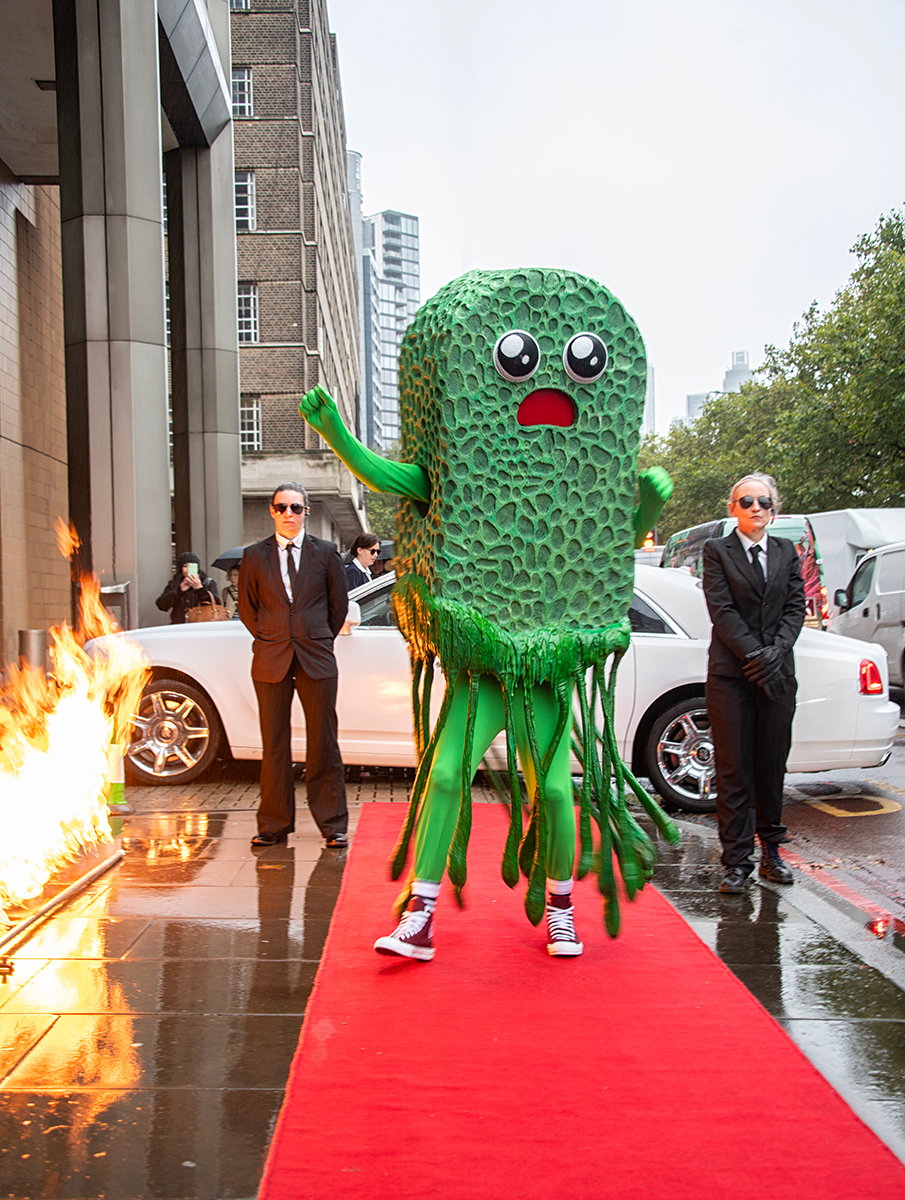
⬆️ Here’s Scrubby! Photo Guy Reece.
If the IMO does not act Ocean Rebellion demands:
The UN must form a new, transparent, and representative body to govern the Ocean for the benefit of ALL life. This new body must have the restoration and replenishment of the Ocean as its only measure of success. It should replace corporate power with people power. And it should represent the many forms of marine life who actually make the ocean a home.

⬆️ “You looking at me?” Photo João Daniel Pereira.